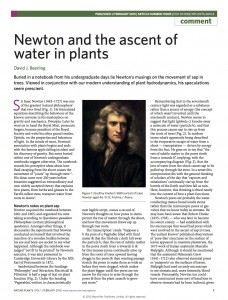Historiann recently reflected on the preponderance of best-selling history books written by men and about men: last year 21 of the 23 best-selling history books were written by men. As she pointed out, audiences never seem to tire of biographies recounting the heroic man who has somehow contributed to our modern world. While she focused her attention on biographies of the “Founding Fathers,” much of what she said applies equally to history of science, e.g.,
…These biographies are also invested in a particularly modern kind of subjectivity, that of the heroic individual who bends history to his will. He’s a man of singular genius, one whose fortunes aren’t made by his family, commuity, or the times in which he lived.
…Traditional biographies like these commemorate only some kinds of power and politics, and avoid the rest.… Stories about the sagacity, virtue, and political genius of our so-called “Founding Fathers” sell like hotcakes.
History of science often defaults to stories about the heroic individual who bends nature to his will, the man of singular genius, whose achievements weren’t made possible by his family, his community, or the times in which he lived, but often despite that family, that community, or those times. Such stories commemorate certain kinds of power and knowledge while ignoring or explaining away others.
Two recent but very different examples—one popular one scholarly—illustrate these points. “These 5 Men Were Scientific Geniuses. They Also Thought Magic Was Real” marvels at the genius of Galileo (and Kepler) despite their lingering belief in astrology, at Newton’s (and Boyle’s) despite their dabbling in alchemy, at Paracelsus’s despite his reliance on natural magic.[1] These “geniuses” contributed to modern science despite their community and the times in which they lived. Internet audiences cannot get enough of these posts—this one has been shared nearly 10,000 times in four days.
“Newton and the ascent of water in plants” offers a more scholarly example. Here a modern scientist celebrates Newton’s work as a “perceptive” or “prescient” version of what he knows/does today:
It should come as little surprise that Newton’s genius was capable of presciently imagining the germ of an idea explaining the ascent of sap in plants some two centuries before botanists came up with it for themselves.

The author has extracted from Newton’s notebooks a single paragraph, which he then interprets as a forerunner of his own research. Here the lure of commemoration prevents the author from considering this paragraph as part of a larger notebook that includes all sorts of other, less laudable (at least from our perspective) forms of knowledge—e.g., just a few pages earlier Newton cites the Bible in his reflections on the earth:
Its conflagration testified 2 Peter 3d, vers 6, 7, 10, 11, 12. The wiked (probably) to be punished thereby 2 Pet: 3 chap: vers 7.
The succession of worlds, probable from Pet 3c. 13v. in which text an emphasis upon the word wee is not countenanced by the Originall. Rev 21c. 1v. Isa: 65c, 17v. 66c, 22v. Days & nights after the judgment Rev 20c, 10 v.
Instead, the modern researcher sanitizes Newton’s thought, trimming from as if irrelevant those bits that don’t contribute to his modern science. Moreover, the ideal of the lone genius requires that Newton’s knowledge sprang from his head alone:
Reclusive and secretive, it’s doubtful he [Newton] gained botanical inspiration from conversations with others at Cambridge University interested in plants. Although his contemporaries were certainly thinking about plant anatomy and function around the same time.
The desire to celebrate the heroic genius struggling alone to discover truths about the world stems, at least in part, from the role that discovery plays in science and histories of science. Although discovery is often considered a forward-looking process, it is rather a retrospective judgement by scientists that seeks to assert a set of values and commend current research and researchers by linking them to exemplary practices.[2] It is no accident that “Newton and the ascent of water in plants” begins by praising Newton as “one of the greatest ‘natural philosophers’ that ever lived” and concludes by associating him with “another founding father of plant physiology.”
What would it look like to tell non-heroic histories of science? Can we make such histories compelling so that people would listen?
-
The post radically misrepresents the historical practice of astrology and its place in early modern thought. The entries are Linnaeus and Brahe are too confused to merit comment. ↩
-
For more on discovery, see “Discovery in Thomas Kuhn’s Structure” ↩
One reply on “Moving beyond Heroic Geniuses”
[…] Moving beyond Heroic Geniuses […]